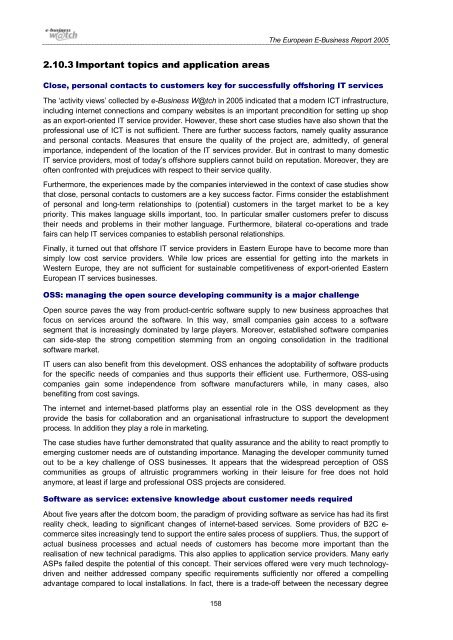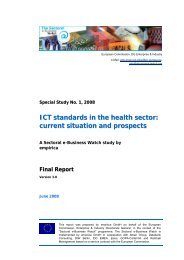The European e-Business Report The European e ... - empirica
The European e-Business Report The European e ... - empirica
The European e-Business Report The European e ... - empirica
Create successful ePaper yourself
Turn your PDF publications into a flip-book with our unique Google optimized e-Paper software.
<strong>The</strong> <strong>European</strong> E-<strong>Business</strong> <strong>Report</strong> 2005<br />
2.10.3 Important topics and application areas<br />
Close, personal contacts to customers key for successfully offshoring IT services<br />
<strong>The</strong> ‘activity views’ collected by e-<strong>Business</strong> W@tch in 2005 indicated that a modern ICT infrastructure,<br />
including internet connections and company websites is an important precondition for setting up shop<br />
as an export-oriented IT service provider. However, these short case studies have also shown that the<br />
professional use of ICT is not sufficient. <strong>The</strong>re are further success factors, namely quality assurance<br />
and personal contacts. Measures that ensure the quality of the project are, admittedly, of general<br />
importance, independent of the location of the IT services provider. But in contrast to many domestic<br />
IT service providers, most of today’s offshore suppliers cannot build on reputation. Moreover, they are<br />
often confronted with prejudices with respect to their service quality.<br />
Furthermore, the experiences made by the companies interviewed in the context of case studies show<br />
that close, personal contacts to customers are a key success factor. Firms consider the establishment<br />
of personal and long-term relationships to (potential) customers in the target market to be a key<br />
priority. This makes language skills important, too. In particular smaller customers prefer to discuss<br />
their needs and problems in their mother language. Furthermore, bilateral co-operations and trade<br />
fairs can help IT services companies to establish personal relationships.<br />
Finally, it turned out that offshore IT service providers in Eastern Europe have to become more than<br />
simply low cost service providers. While low prices are essential for getting into the markets in<br />
Western Europe, they are not sufficient for sustainable competitiveness of export-oriented Eastern<br />
<strong>European</strong> IT services businesses.<br />
OSS: managing the open source developing community is a major challenge<br />
Open source paves the way from product-centric software supply to new business approaches that<br />
focus on services around the software. In this way, small companies gain access to a software<br />
segment that is increasingly dominated by large players. Moreover, established software companies<br />
can side-step the strong competition stemming from an ongoing consolidation in the traditional<br />
software market.<br />
IT users can also benefit from this development. OSS enhances the adoptability of software products<br />
for the specific needs of companies and thus supports their efficient use. Furthermore, OSS-using<br />
companies gain some independence from software manufacturers while, in many cases, also<br />
benefiting from cost savings.<br />
<strong>The</strong> internet and internet-based platforms play an essential role in the OSS development as they<br />
provide the basis for collaboration and an organisational infrastructure to support the development<br />
process. In addition they play a role in marketing.<br />
<strong>The</strong> case studies have further demonstrated that quality assurance and the ability to react promptly to<br />
emerging customer needs are of outstanding importance. Managing the developer community turned<br />
out to be a key challenge of OSS businesses. It appears that the widespread perception of OSS<br />
communities as groups of altruistic programmers working in their leisure for free does not hold<br />
anymore, at least if large and professional OSS projects are considered.<br />
Software as service: extensive knowledge about customer needs required<br />
About five years after the dotcom boom, the paradigm of providing software as service has had its first<br />
reality check, leading to significant changes of internet-based services. Some providers of B2C e-<br />
commerce sites increasingly tend to support the entire sales process of suppliers. Thus, the support of<br />
actual business processes and actual needs of customers has become more important than the<br />
realisation of new technical paradigms. This also applies to application service providers. Many early<br />
ASPs failed despite the potential of this concept. <strong>The</strong>ir services offered were very much technologydriven<br />
and neither addressed company specific requirements sufficiently nor offered a compelling<br />
advantage compared to local installations. In fact, there is a trade-off between the necessary degree<br />
158

















